 MyDogBreeds
MyDogBreeds Toy Mi-Ki is originated from United States but Australian Collie is originated from Australia. Toy Mi-Ki may grow 10 cm / 3 inches shorter than Australian Collie. Toy Mi-Ki may weigh 20 kg / 44 pounds lesser than Australian Collie. Toy Mi-Ki may live 4 years less than Australian Collie. Both Toy Mi-Ki and Australian Collie has almost same litter size. Both Toy Mi-Ki and Australian Collie requires Moderate maintenance.
Toy Mi-Ki is originated from United States but Australian Collie is originated from Australia. Toy Mi-Ki may grow 10 cm / 3 inches shorter than Australian Collie. Toy Mi-Ki may weigh 20 kg / 44 pounds lesser than Australian Collie. Toy Mi-Ki may live 4 years less than Australian Collie. Both Toy Mi-Ki and Australian Collie has almost same litter size. Both Toy Mi-Ki and Australian Collie requires Moderate maintenance.
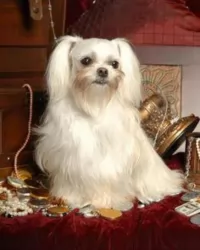 The Toy Mi-Ki is a sociable companion dog. He hasn’t got a long history, and the little bit of history there is, isn’t clear.
The Toy Mi-Ki is a sociable companion dog. He hasn’t got a long history, and the little bit of history there is, isn’t clear.
It is believed that the breed was bought about by Maureen Westburg. It was in the 1980s that she crossed several toy breeds to develop the Mi-Ki. It is thought that she gave the dog the name Mi-Ki because her name was Mikkie. It seems whe wanted a dog that came close to looking like a gremlin.
Some of the dogs used in the breeding program were the Japanese Chin, the Maltese, and the Papillon. The International Miki Registry is trying to get recognition with the United Kennel Club for this dog. There are other canine clubs and organizations that recognize the Mi-Ki Dog as a breed.
 The Koolie, as a breed we know today, originates from Australia. But, before they were breed and imported, they were the mix made of Britain smooth coated blue merle Collie and the Black and Tan Collie from the Highlands of Scotland. The Koolie came to Australia to work as a kennel dog since they are known as the working, farm dog that can adapt to any weather condition. They were bred to be agile and non-aggressive quiet herding dogs, and they have kept most of those good characteristics until today.
The Koolie, as a breed we know today, originates from Australia. But, before they were breed and imported, they were the mix made of Britain smooth coated blue merle Collie and the Black and Tan Collie from the Highlands of Scotland. The Koolie came to Australia to work as a kennel dog since they are known as the working, farm dog that can adapt to any weather condition. They were bred to be agile and non-aggressive quiet herding dogs, and they have kept most of those good characteristics until today.
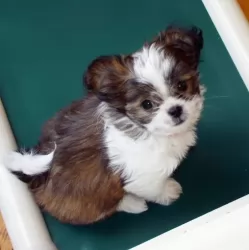 The small Toy Miki stands at between 25 cm – 30 cm in height and weighs between 2 – 5kg. You get two different coat types – long and short and the long-haired variety also has quite a bit of hair around the face.
The small Toy Miki stands at between 25 cm – 30 cm in height and weighs between 2 – 5kg. You get two different coat types – long and short and the long-haired variety also has quite a bit of hair around the face.
His longish coat is low-shedding which makes him popular for people who battle with allergies. The Miki Dog will produce about 2 – 4 puppies.
As a toy dog, he has a domed head with large eyes. Their ears are feathered and are carried erect and the tail is long and feathered.
These little dogs are popular companion dogs and they’re intelligent and loving, making the ideal pet for anyone.
It’s a friendly dog and yet he will bark to alert you of an intruder. Youll take notice because he isn’t the kind of dog that just yaps away.
Children love them and they make great playmates for children who have been taught to be kind and gentle with animals.
Their small size and their adaptable nature make them suitable for city or country living. Sweet and amicable, the social purebred Toy Mi-Ki is everything you want in a companion.
He is loyal and devoted, calm and adaptable. They’re not the kind of dogs to go jogging with you, but nonetheless, he will still need his exercise – walks every day as well as ball games.
 Koolie is a medium bred. Their head is small, with a pointy jaw. Ears are pricked, semi-dropped or dropped. Their coat can be smooth or rough, short or medium length, always with the undercoat. The colours can be Red or Blue Merle, solid Red or Black, sometimes with minimal white or cream speckles. They are usually two-coloured or tricoloured, but some of them are actually one-coloured.
Koolie is a medium bred. Their head is small, with a pointy jaw. Ears are pricked, semi-dropped or dropped. Their coat can be smooth or rough, short or medium length, always with the undercoat. The colours can be Red or Blue Merle, solid Red or Black, sometimes with minimal white or cream speckles. They are usually two-coloured or tricoloured, but some of them are actually one-coloured.
Some Koolie have one or two blue, green or yellow eyes. Eye colour is, of course, affected by the gene that creates the coat pattern and eye colour as well.
They are athletic dogs, with fine bone structure but great stamina. Actually, they were breed to be like that – to work hard, be noticeable among the sheep, eat little and be loyal to one person.
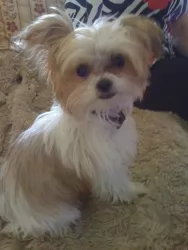 The Mi-Ki is calm and good-natured, and because of his cuteness, he can’t help but become a lap dog, if you allow him.
The Mi-Ki is calm and good-natured, and because of his cuteness, he can’t help but become a lap dog, if you allow him.
He is social and just loves human companionship. He is friendly too and will quite happily be friends with children and pets in the home.
Make sure he is trained and socialized so that you become one of the many people who have nothing but good things to say about this sweet little dog.
 Koolie is naturally energetic, playful and affectionate so they are naturally very good to raise with children.
Koolie is naturally energetic, playful and affectionate so they are naturally very good to raise with children.
They are known as great obedience dog. They are very famous as the tracking dogs.
Some of them are successful as the rescue dogs, therapy dogs or educators for school children.
This is not a type of dog that will be alone in the house, wait for you and then be quiet while you rest. They need a great deal of activity and they are not such great choice for indoor life anyways. The best thing for them would be the large yard, with somebody home most of the time. They are great if raised in a family, with children and active owners. They will be great for a loner at the farm as well since that is in their blood. They need enough place to run, chase, play, rest on the sun and be active as they please. They get affectionate towards their families, but they will be accepting their new home when they are older just fine.
They are very good at learning. Intelligent, yes, but yet very silly and playful to do what is told all the time. They will surprise you with how quickly they will pick up the new trick but not feeling like doing it every time you would like them to. Everything is a play for them, so it would be best if you know how to play, be affectionate and friendly to become a good owner of this breed.
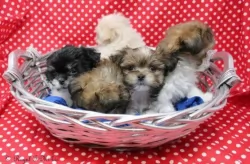 You just have to bear in mind, that because of his short muzzle, he is prone to respiratory problems. Too much exercise and you may find him huffing and puffing. Be careful on a hot day.
You just have to bear in mind, that because of his short muzzle, he is prone to respiratory problems. Too much exercise and you may find him huffing and puffing. Be careful on a hot day.
Also, little dogs like this often have all kinds of dental problems. When you brush him, check his teeth because he can’t tell you if he has a rotten tooth causing him a lot of pain and misery.
Check his eyes too that they are bright and clear and check the inside of his ears. Hypothyroidism and eye issues can also bother the Mi-ki.
 If you are careful enough, you will choose your Koolie form patiently chosen breeders, after checking the health history of the pup and the pup’s family. Advisable is to do these things in person and never to buy a Koolie from a pet shop.
If you are careful enough, you will choose your Koolie form patiently chosen breeders, after checking the health history of the pup and the pup’s family. Advisable is to do these things in person and never to buy a Koolie from a pet shop.
Sometimes, pups can be born blind or deaf pups. They have the great chance of joint problems because of their extreme activity. Their need to run, jump and play all the time may result in damage to cartilage and ligaments, especially since they are not aware of their age most of the time.
There is a chance that pup has skin allergies or immune system issues if they are growing on a farm near the chemicals used for plants, so be careful what kind of herbicide you use if you have a Collie.
In some rare cases, they suffer from seizers. If untreated, they can cause death. If you decide to take him to a regular vet check, you will have a happy and playful life together.
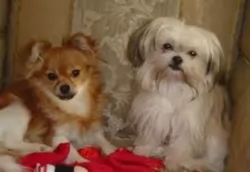 Considered to be low-shedding, the Mi-Ki will benefit from a brush once or twice a week.
Considered to be low-shedding, the Mi-Ki will benefit from a brush once or twice a week.
Some people take their Mi-Ki’s to have their hair professionally cut. This is a good move because then the ears, teeth, and nails are attended to as well.
You can do all of these things at home yourself, but sometimes, particularly with the long-haired Miki, the matting of the hair can make it that you rather send him to professional groomers.
Like all dogs, the Mi-Ki dog will need nutritious food if he is to stay healthy. He isn’t a big eater and you will find the perfect food for your small canine pet.
Read on the packaging to make sure you get high-quality dry food for small dogs. You want the ingredients to be as natural as possible without any toxic colorants and additives.
Meat and protein must always be the top ingredients. Try to provide some home-made food too. Boiled chicken, brown rice, spinach, and sweet potatoes can be chopped up finely and a small portion added occasionally to the dry kibble as a tasty treat.
 Whether you choose canned food or dry food, treats as biscuits or left-overs, the quantity is the safest way of keeping the balanced diet for your Collie. They like raw meat and raw bones. Make sure not to feed them with cooked bones because they can do more harm than good.
Whether you choose canned food or dry food, treats as biscuits or left-overs, the quantity is the safest way of keeping the balanced diet for your Collie. They like raw meat and raw bones. Make sure not to feed them with cooked bones because they can do more harm than good.
Since Koolie coat can be very short with the undercoat or a bit longer with undercoat, bristle brushing every 3 or 4 days will be enough for them. Some of them like the water and some of them don’t and that is perfectly fine since there is no need for a regular bath.
Lots of activities and lots of love. They express their love all the time and you can learn a lot from them actually. They like raw bones and from-the-table delicious treats but make sure not to overfeed them.
Games that need them to be fast and think quickly. Running with them, driving a bike with them (but not on the leash!) would be a great fun for them. Why not leash? They are so playful and happy and they tend to jump and run to the side to chase a butterfly or catch the falling leaf.